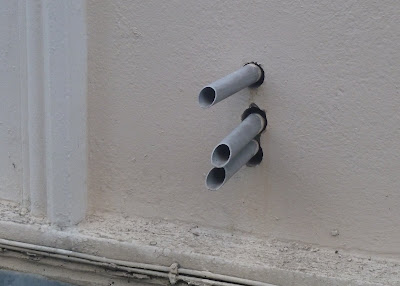

Thisangel which I photographed in a fashion shop called
Wunderkind in Mount Street, London, apparently took an entire night to construct from units of origami put together with the help of a strip of tracing paper 50 meters long. It seems a suitable image with which to wish all those, in no particular order - Clare Grant, Barrett Bonden, Marja- Lena, Martha The Crow, Lucy, Lucas, cc, Dave Bonta, David King - who visit this site quietly or with comments, occasional or frequent, a Christmas joyful but mindful of doubt and disfavour, peaceful but true to the harshness of the world in which we live. Cheers, be merry and think carefully about this moment and the next.
About four years ago I began to read Shakespeare's play
Pericles in the Arden edition. I read the plays when I was travelling on the train and the occasional aeroplane and I was about half way through the entire canon and making good progress. When I stopped it was because this blog quickly became a full time job in the sense that I could no longer travel anywhere without keeping eyes and ears obsessively open for "beautiful things" to report. So
Pericles, my travelling companion, came to be neglected. Until the other day that is, when I responded to a poem on Dave Bonta's website
Via Negativa, by quoting the opening lines of Eliot's poem
Marina, where I detected a distinct though unintentional echo. Dave's response took the form of a link, to a full length post on the Eliot poem. It told me,among many other things, that the Eliot poem is about Pericles' daughter of the same name, who, believed drowned at sea, is restored to her father at the end of the play. What else could I do? It was back to
Pericles, which I finished in a few hours, and enjoyed all the more for knowing its provenance. The poem begins with the magic lines:
What seas what shores what grey rocks and what island
What water lapping the bow
And scent of pine and woodthrush singing though the fog
What images return
O my daughter.
The best of many things about Christmas is the Christmas story and the message behind it. I have come to accept that the story has a reality and a truth of its own derived from the peoples and cultures which have adopted and embellished it over the years. But I cannot believe, and never did, that the details as recounted in the gospels have much if any historical truth. This morning I go over the opening chapters of Matthew and Luke to refresh my memory and the magnificent words of the King James bible lift my heart as they always do. "Fear not: for, behold, I bring you tidings of great joy, which shall be to all the people." Then, " "Glory to God in the Highest, and on earth peace, good will towards men." Word so familiar that they barely need repeating , except that copying them here is a pleasure in itself. For hope and aspiration, you can't do much better than that. And though a voice in your ear says, " that is impossible to attain", you know that impossible though it may be, what we are talking about is art, and all art strains toward the impossible. As does scinece towards the unknowable. And it is the tension of the process that makes it sublime. "A man's reach should exceed his grasp, Or what's a heaven for?
Compasses (see right) has a new poem by Lucy Kempton. posted just now. It replies to the question, "How then should we live in the space there is?" I love it for its music and the pictures it brings of the countryside where Lucy lives.

 This snow giant at the entrance to The Grove stood about three metres high when I took the photograph a few days ago. He is now no more than a mound of ice about a few centimetres across.
This snow giant at the entrance to The Grove stood about three metres high when I took the photograph a few days ago. He is now no more than a mound of ice about a few centimetres across.




















 Composition in a skip.
Composition in a skip.

